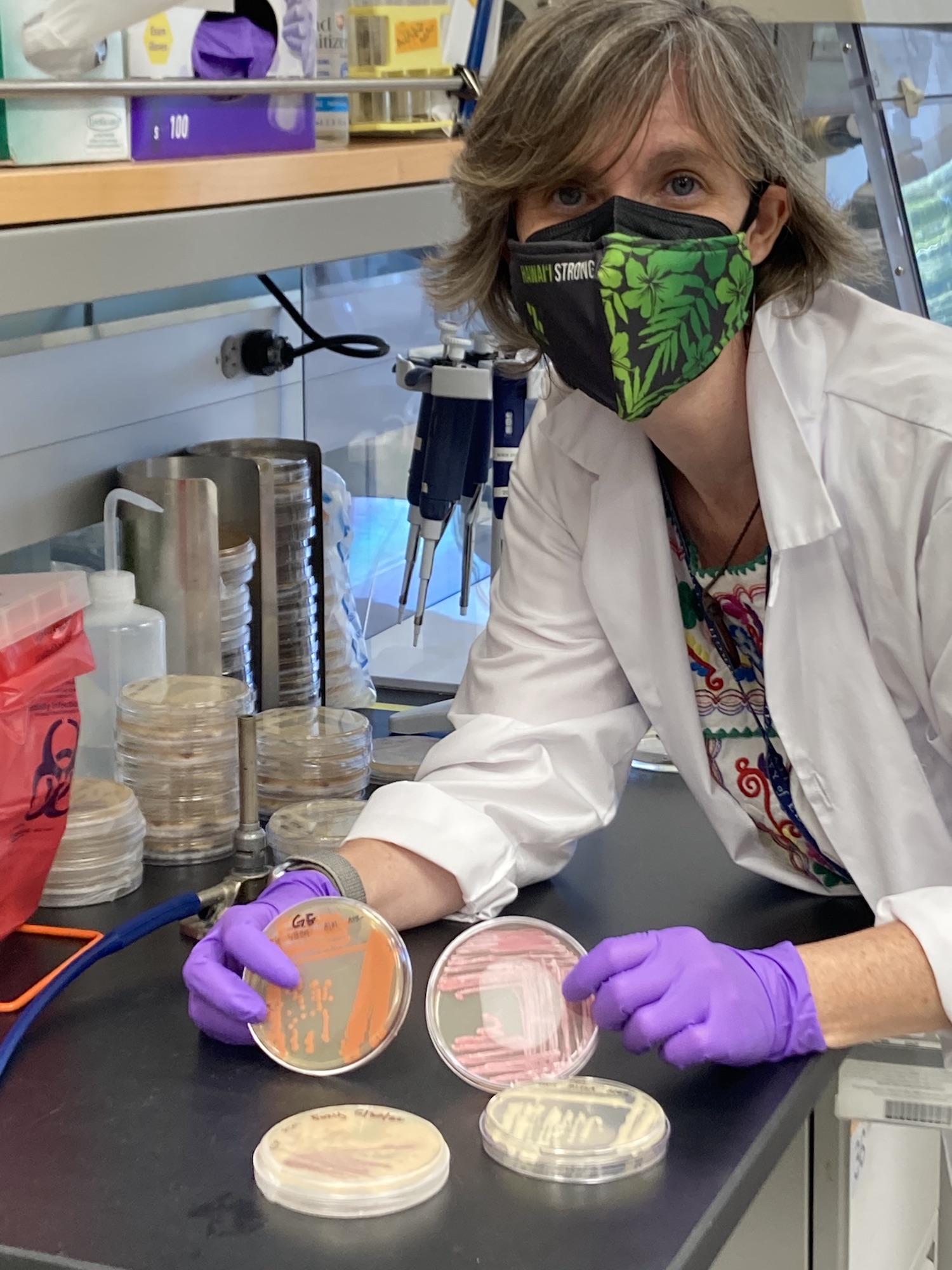NASA researcher studies microbes to help advance our understanding of life on meteorites and Mars

Dr. Rebecca Prescott with four strains of microbes, two of which are new species, make quorum sensing molecules, and bright colors! She works with a variety of microbes from nature that produce quorum sensing molecules, and hopes to expand our understanding of how microbes can work together in nature to survive in extreme environments like Mars. Image Credit: Sean Leary
Center: Johnson Space Center
For Rebecca Prescott, the science “bug” bit her very early. She studied the stars and constellations with her father, a meteorologist. She received her first microscope in the 6th grade and collected water from a small local pond so she could watch the microbes swimming around.
As a research fellow with the NASA Postdoctoral Program (NPP) with the Johnson Space Center, she merged space and biology interests into her studies of astrobiology and space biology-related projects. “I believe space exploration is one of the most important areas of advancement for our societies,” Prescott said.
Prescott, who holds a doctorate in microbiology from the University of Hawai'i at Mānoa, is currently studying how fungi and bacteria may interact and coordinate to “eat” meteorites and asteroids, two examples of basalt-type rocks. Her research will aid in the preservation of extraterrestrial materials, such as moon rocks and asteroid materials currently stored at Johnson Space Center,
She also recently published a paper on another basalt rock environment: lava caves and fumaroles across the Island of Hawai'i.
“Volcanic systems in Hawai'i are geologically like those on ancient Mars, which had active volcanoes and fumaroles,” said Prescott. With these geological similarities, Hawaiian volcanic environments can provide some insight into the possibility of life on Mars in its ancient past and how microbial communities could survive today on Mars in lava caves.”
Prescott studies quorum sensing in microbes, which is a complex communication system between microbes that uses chemicals to allow microbial communities to coordinate their activities. This research helps to better understand how microorganisms communicate with one another so they can survive in harsh environments, whether that's in Hawaiian lava caves, on meteorites, or on Mars.
“Microbes are truly like creatures with superpowers,” she said. “Their diversity and adaptability are continually amazing. We cannot survive without them on Earth, the moon or Mars.”
According to Prescott, microbes also are critical to helping explorers survive during space travel and growing food on the moon or Mars.
Prescott said her days are diverse and busy. “Sometimes I have to be in the lab setting up experiments, maintaining cultures, checking them under a microscope, or helping extract quorum sensing molecules from microbial cultures using some nasty chemicals,” she said. “Other days, I am leading training workshops with graduate students or public school teachers in bioinformatics and microbial genomics.”
She recently completed a teacher/mentor retreat in the Scottish Highlands that she organized with colleagues.
Prescott credits her fellowship with gaining new experiences and honing her research focus. “This project helped move my research interest in a direction that is focused on microbial-mineral interactions, and the importance of those interactions in implementing sustainable farming on Earth and beyond,” she said. Prescott said she also gained new skills in geomicrobiology-related research that can help develop further research questions, as well as an understanding of NASA missions and how they work.
She said these skills will help her as she continues to build her research career that she hopes will include opportunity to further the exploration of space, establish human bases on the moon and Mars and create sustainable societies on Earth and beyond.
About the program: NPP offers unique research opportunities for highly talented U.S. and non-U.S. scientists to engage in ongoing NASA research projects at a NASA Center, NASA Headquarters or at a NASA-affiliated research institute. These one- to three-year fellowships are competitive and are designed to advance NASA's missions in space science, Earth science, aeronautics, space operations, exploration systems and astrobiology. ORAU manages NPP for NASA.
